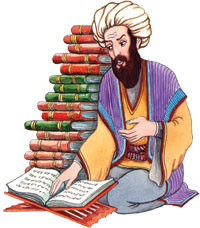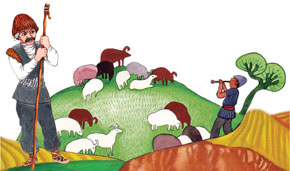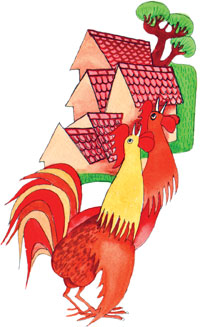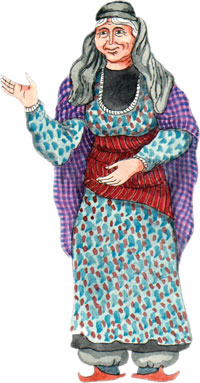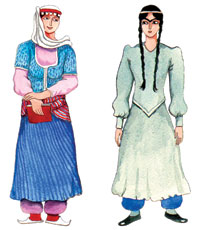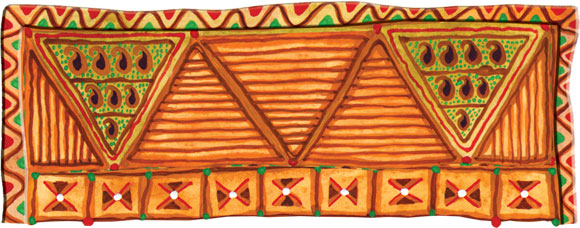
Pages 88-92
by Sara Nazirova
Dedicated to my elderly grandmother Chichak
There is a village on this earth. There are a thousand houses in that village and its orchards and vegetable gardens are scattered amongst the bushes. Neighbours are separated from one another not by fences but by hedges. If no pastures or collective farm vegetable plots are left fallow, the head of the family considers himself suffocated. It’s difficult to walk from one end of the village to the other in a day. The village is a forest of old walnut, oak and chestnut trees. It breathes through the cawing of the crows, the lowing of the cows and buffalo, through the wonderful shouts and voices broken by the cliffs and ravines.
The Lower Part, the Upper Part, the Hulling Yard, the Market Place, the River Bank, the Grass Snakes Yard were all as large as a village. The people of the village were known by their nick-names. There were many men named Ahmad. Which Ahmad? Jinn Ahmad. The Itamans which of them? The bitches… There were these nicknames too. They would not marry a girl from their own family. The women could do nothing but live up to their nicknames.
Asmar knew that in this village every quarter had a mullah of its own and every mullah had a library of his own. She was thinking about her grandmother’s neighbour, Auntie Zubey-da. ‘They are bound to have one,’ she thought.
All the way there she remembered her childhood the first books, the thick, black books written in the Arabic script, the old, fragrant, leather-bound books whose pictures she had torn out because she liked them. She still remembered her grandmother’s voice, admonishing her: ‘I wish you had perished in the bud, why have you torn up a book? It’s a sin, my daughter. That’s the Koran!’ Only when she grew up did she realize that her grandmother, as an illiterate woman, thought that all books writt en in the Arabic script were the Koran and she probably thought that the word Koran should inspire respect for books.
The books were Mullah Juma’s, her grandmother’s neighbour. During the years of the campaign against religion, he had hid his books at his reliable neighbour’s as he was afraid of the government. Who knew what the books were? He was a mullah which meant that the books must be the Koran. At that time my grandmother, Ayaqgelin Behbud, was chairman of the village soviet and did not know that the Koran would not be illustrated with miniatures.
Mullah Juma had spent half his life studying in Baghdad. When he came back, the books he brought from Baghdad filled his empty house. And the people of the village used to say that they had seen an educated mullah, but not one as well educated as Mullah Juma. ‘You, man, go and study for four years – that’s enough. Then come back, bury the dead and register marriages.’ Health visitor Babi Shirin in particular didn’t go on well with him. ‘When you are grieving and give Mullah Juma two shahis[1] to read the Yaseen[2] he bores God with his reading all night long,’ he said. I can’t say whether Mullah Juma married in his old age or died early, but, his only heir, Useless Safar, was orphaned as a baby. He grew up looking after sheep and calves for different people. When the wages were distributed, he inked his five fingers and put them next to his name as a shepherd of the collective farm, Safar Juma oghlu[3]. With his goat-like voice, he would bleat greetings to his acquaintances, asking after their health. In return, when asked the same questions, he would say ‘Fine’ and go on his calm, absent-minded way, his long shepherd’s crook over his shoulder. When Asmar looked at Uncle Safar – a remarkably tall, thin man, which was not typical of people in the village, at his kind eyes and the cap that shook on his head like a haystack when he spoke – she somehow saw him as a bald person with spectacles, although nobody but Auntie Zubeyda had ever seen his head. Asmar could have been the only person in the world who thought that Uncle Safar had been nicknamed Useless because he had no bushy moustache or booming voice that joined one insult to another and had nothing of the robber or brigand about him Her grandmother told Asmar that Zubeyda’s elder boy, Yavar, had got married. ‘At least there will be someone to take care of long-suffering Zubeyda, someone to give her hot tea,’ her grandmother said to herself.
As Asmar’s grandmother said, Auntie Zubeyda, who shouted at the top of her lungs at home and overfulfilled the tobacco plan every year, was top dog in her own house.
Neither adults nor children felt the existence of Uncle Safar who spent summer at the summer pastures in the mountains and winter at the winter quarters, rarely visiting his house. Grandmother said it was probably all because he walked like ‘soap suds on water’.
This was the same Auntie Zubeyda who towards evening would squeal in surprise and pleasure and run to hug and kiss Asmar many times. She was a short woman, with round red cheeks and a wheezing chest. They said that it came from her lungs. When she saw Auntie Zubeyda after many years away, Asmar thought: ‘It’s impossible. If that’s how her lungs are, she would have passed away long ago. Where does this noise come from?’
Bustling about, Auntie Zubeyda said sadly, ‘See how badly education has aff ected the child?’ ‘You girl, you didn’t come to pick violets this spring. Why not? Do you think you’re grown up already?’ Auntie Zubeyda wouldn’t keep quiet.
‘You know how thick the violets grow in spring. Your granny was expecting you.’ Asmar read something very diff erent in Auntie Zubeyda’s eyes: ‘There are lucky people who come 500 kilometres to pick violets. They say, “You fancy yourself. You don’t keep your aunt’s son in your house only to be a tenant yourself.”’ When she asked about the books, Auntie Zubeyda began: ‘By God, there’s no book left. A Jew took a cartload of them. And people from Dagestan took another cartload. The rest of them were used to press tobacco. I put the pages between the bundles.’
Asmar felt a dull bitterness in her body. All her life she had known that there were rare manuscripts in the house. She had always talked about them but hadn’t found time to come and get them. But she never imagined that the manuscripts would have been used to bundle tobacco. Auntie Zubeyda used them all the time.
‘The rest burned when the attic caught fire. Now I collect newspapers from people to press and make the tobacco packages.’
‘What do you mean, Auntie Zubeyda, when the att ic caught fire?’ Asmar tried to keep her voice calm. ‘Didn’t you hear me? When the attic caught fire! Don’t you know there was a fire in your auntie’s attic? We had so much trouble rebuilding the roof.’
With her last hope of finding any of the manuscripts, Asmar said: ‘Maybe we could go up to the attic and have one more look?’
‘Even if there are any, they are just odds and ends and scraps of burnt manuscripts. There might be a couple of sacks full. But what shall I do without them when I package tobacco? Don’t you know that your aunt is a shock worker?’ she said and fl ushed shyly for saying something that she felt was not very modest.
Asmar had a long talk with Auntie Zubeyda. She told her that she could find her as many newspapers as she needed to press tobacco and make packages. She said that those manuscripts were very valuable and that she might make more money out of the manuscripts than growing tobacco, if she sold them to the manuscripts’ foundation.
Auntie Zubeyda nodded, pretending to understand. ‘I gave them away free to a Jew and a Lezgin[4],’ she said.
After a long conversation, Auntie Zubeyda agreed that Asmar could go up to the attic, as she could not refuse a request from Granny Ulkar’s granddaughter. If a farmer ever allows you to go up to his attic, you should know that it is equivalent to a banker allowing you into his safe or a king into his treasury. Even members of the family do not have the right to go up to the attic without permission from the head of the family. A farmer only locks one door of his house and that is the door to his attic. Do you think they hide rare objects there? No! Beans, onions and potatoes from the garden, occasionally nuts and walnuts, wheat for the year, one or two packages of tobacco which may have been above the norm and are to be kept for the following year. Copper pots with holes in them which have been replaced by aluminium pans. In this attic there were two or three dusty sacks containing morocco bindings, book pages written in the old script and miniatures.
It was growing dark. ‘Come back tomorrow in the daylight and choose then,’ Auntie Zubeyda said, calling Asmar down from the attic. Asmar agreed because she didn’t want Auntie Zubeyda to have to bring her a lamp. She thought Auntie must be tired after a day’s work and it would be better to come the following day.
In the morning when she went to Auntie Zubeyda’s together with her aunt’s son, the door of the attic was locked and Auntie Zubeyda had gone to work. Asmar had forgotten. She had forgotten that Auntie Zubeyda always worked from dawn till dusk in the fields. She came home when it was growing dark. While still at the gate of her house she would shout in her wheezing voice: ‘You, Yavar, have you brought the cow in? Murad, have you cleaned out the stable? You, Irada, have you fetched water?’ Asmar’s grandmother would say: ‘Zubeyda’s back.’
Grandmother’s words ‘Zubeyda’s back’ did not refer only to Zubeyda but determined the time that the sun was setting, when the day was over and it was time to come home.
There was only one girl at home. When her aunt’s son told Asmar, ‘She is Yavar’s bride,’ she thought there must be a misunderstanding. In front of her stood a child in an old dress, the colours of which had all run into each other.
The leathery skin of her thin arms stretched out of her short coat of coarse black calico. Her hands were red and swollen from cold water, her face with its turned-up nose and child’s lips bore an expression of timidity and misery. She was a child who could hardly stand under the weight of her heavy burden. Just a child who needed plenty of food and care to help her grow up. She needed to be bathed so that she would feel better and play with the children. Most astonishing of all, she seemed to see herself through Asmar’s eyes and to be ashamed.
Asmar’s cousin asked her in a friendly manner: ‘You girl, have you got any water to drink?’ The bride rushed for a glass, took water out of a pot covered with a round copper tray and gave the glass to him. The nervous haste of the bride reminded Asmar of what her aunt’s husband had said to her many times so that she should remember it. ‘When someone comes in, get up. In the presence of other people, kneel down, don’t utter a word. Be quick in your work and keep your eyes down when you walk.’
Asmar recognized the tray which was used to cover the pot. She remembered visiting Auntie Zubeyda when was shaking a mulberry tree. Her grandmother used to say that Auntie would involve seven families in the process. She knew that mulberries didn’t grow in the lower part of the village at that time. They would pour the mulberries onto trays and put them in front of her: ‘Eat them, my daughter, they are as big as breast nipples.’
And Asmar would pick them up with their stalks to reveal the images of birds and decorated circles on the tray.
She would suck the mulberries and throw the stalks away while admiring the decorations on the tray.
When asking for water, Asmar’s cousin had addressed the girl as though he were older than her. This was insulting. This was insulting to the bride, to Asmar and to all the women of the world who would be spoken to in the same way by Asmar’s cousin. Asmar had a whole dictionary in her head. A girl’s violet was a dog’s violet, a white violet that had no scent. White violets were called dog’s violets. Dark, sweet-smelling violets, real violets, were called boy’s violets in these parts. Tasteless, strawberries, strawberries with small fl owers, were called girl’s strawberries in these parts. It’s true that these strawberries looked very elegant and were a deep, dark red. Boy’s strawberries were big, sweet strawberries.
In our language the best part of spring and severest part of winter were called the ‘boy’s time’. Suddenly a light fl ashed on in Asmar’s head. ‘May you marry too young, like a newly bursting bud!’ When she was a child, she liked this curse She imagined a newly blossoming cucumber plant with its yellow fl owers or a pumpkin plant climbing up the walls of a ruined house. She had asked her grandmother: ‘What does “like a newly bursting bud” mean?’ Her grandmother had explained to her. And she had understood. But now, only now when she saw the bride, did she understand the real meaning of the words. ‘May you marry when you’re a newly bursting bud.’ ‘Auntie Zubeyda said yesterday that I might come and see the books,’ she said to her.
‘My mother has gone to the fields. I can’t let you in without her,’ the bride said helplessly. Asmar’s cousin said: ‘You, girl, didn’t Auntie Zubeyda tell you last night? Why did you lock the attic door as soon as you woke up?’‘She did not tell me to do that. She did it herself,’ shesaid, feeling dreadfully ashamed.
In the corner Asmar could see an old rolling pin,browned from long use, a four-legged board for rolling out dough, empty shelves covered by curtains, yellow-whitewashed walls, a mantelpiece and burning fire. The neatly whitewashed earthen fl oor was refreshingly cool. It reeked of childhood memories. She remembered the old days when children used to play ‘the farmer wants a wife’ in that room, and how for some reason they never invited her to join in the games. She remembered she had been upset and she remembered what she had always longed for.
Yavar’s bride was so far from the idea of a bride that as Asmar looked at her, it seemed that the game ‘the farmer wants a wife’ was still going on and that she was out of the game again. Asmar suddenly felt ashamed. It was hard to say whether this was because she had put the bride in an unpleasant situation, or because she wanted to take something from this house. Let the manuscripts be. Let them use them to make packages of tobacco… She also felt ashamed, because she wanted to leave that place immediately to escape the weight pressing down on her chest, lest the peace in her heart be disturbed.
(Footnotes)
1. A shahi is a small coin worth fi ve copecks.
2. The 36th chapter of the Koran which is often read as a funeral prayer.
3. Safar Son of Juma
4. The Lezgins are an ethnic group that live mainly in northern Azerbaij an and southern Dagestan.
Picture by
Ismayil Mammadov
